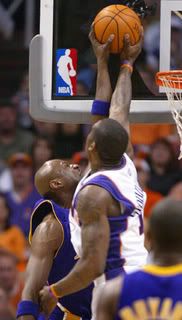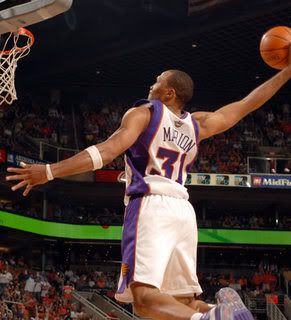"A precedent wasn't necessary here. The rule with respect to leaving the bench area during an altercation is very clear."
No, Stu, it is NOT "very clear". "Vicinity of the bench" can be interpreted in as many ways as "altercation". What about a verbal altercation? What about the angry glares that players sometimes give each other after a particularly hard foul - the ones that result in technical fouls for both players? What about the hash mark 28 feet from the baseline that players and coaches are not allowed to pass unless they are checking in at the scorers' table?
"(Horry) was suspended two games for flagrant fouling Steve Nash and also placing forearm and his elbow on shoulders of Raja Bell."
What about inciting the alleged altercation? Why no punishment for an act that resulted in players leaving "the vicinity of the bench"? And the physicality of the series has gotten progressively worse, evidenced by complaints about it from the Suns. Was Horry's action not an escalation in itself? Why was the Spurs organization not penalized for allowing a player to cause an altercation?
"Both Diaw and Amare are 20 to 25 fee away from their seats in the bench area going toward the altercation. In our minds, that is clearly away from the vicinity of their bench."
A-ha! In YOUR MINDS. In other words, you interpreted the rule in such a way that resulted in two Suns' suspensions. If it's such a hard and fast rule, why all the video review to decide whether or not Stoudemire and Diaw were "in the vicinity"?
"This is a very unfortunate circumstance. No one here at the league office wants to suspend players any game, much less a pivotal game in a second round of a playoff series but the rule however is the rule and we intend to apply it as consistently as we have in the past to achieve the purpose of the rule."
Like when you let the Sacramento Kings off the hook in 2003, when Rick Fox attacked Doug Christie in the tunnel? The Kings didn't know what was going on, their teammate could have been in real danger, no one on the Kings' bench knew that it was a Laker attacking their man. Still, they broke the rule. Oh, that's right. You already excused that at the top of this page. But I still have to ask...is it a rule or isn't it a rule? If you can excuse an entire team for extenuating circumstances, why not two Suns players who did nothing wrong, and who were sticking up for their teammate as if he were Doug Christie?
"While (Duncan) should not have been on the game court, there was no altercation occurring in that time he was off the bench."
We need to work on your concept of "altercation". The only reason those players ran down court after the incident was that two officials were standing right there and told them to. The same officials who prevented the later incident from escalating.
"Both players (Diaw and Stoudemire) stood and then made their ways toward the altercation, which occurred on the court. They did not remain in the bench area as the remaining players did."
Which remaining players? The Spurs? Pat Burke and Sean Marks? To whose standards are you holding Diaw and Stoudemire?
"Everything we do here at the league office is up for re-evaluation. If a change is warranted going forward, we will take a look at perhaps tweaking the rule."
Well, we appreciate that. You can't even throw Suns fans a bone and say that, yes, the rule is terrible in this case, so we will investigate rewording it WITHOUT OUTSIDE PRESSURE? You insult the intelligence of every NBA fan with your use of the word "if".
"(The immediate vicinity of the bench) is around the bench area -- close by. In the case of Diaw and Stoudemire, I could not describe them as being close to the bench."
Again, we're dealing with an interpretation of vague wording in a rule that you describe as clear. Now can you tell us what it means to be "close by"? What would you describe as "close to the bench"? Just for the sake of clarification, of course.
"The rule is clear. It's a bright line. Historically, if you break it, you get suspended regardless of what the circumstances are."
Unless you are the Sacramento Kings or San Antonio Spurs in game one (more on that in the days to come).
"Francisco Elson, when he went for the dunk and fell over the Phoenix player, that's what he did. He dunked, he fell over. Both players got up. There was no altercation and they run down to the other end of the court. In the other situation, there were confrontations between multiple players."
Did you watch the video? Did you not see Elson get in Jones' face before the officials broke it up? Interesting way you have of backing up your game officials. You didn't notice their work on that play, then you undermined their efforts at the end of the game. How noble.
"The purpose of the rule is to prevent the escalation of these types of altercations and then in turn protect the healthy and safety of our players."
Then the rule did not come into play, and it should never have been implemented. There was no escalation. The referees did a fine job of ensuring everyone's safety.
"If it's a rule that needs to be revisited, we're open to revisiting it but right now the rule is very clear."
Yeah, you said that already. Right after the part where you felt compelled to interpret the rule as far as where Diaw and Stoudemire were standing.
"I've not seen a player report in quite that way (in relation to Stoudemire's claim that he was checking in)."
You've also never seen a player resting on the bench without warmups. If Amare was not preparing to check in, then he would have been wearing his warm ups and had ice taped to his knees. Regardless of Stoudemire's story, it is your duty to give the player the benefit of the doubt when the truth is not clear and the excuse is plausible. Would you have felt better if he simply said that he was checking on Nash? Well, you didn't accept it from Diaw (he's French, ya know - not exactly known for being in attack mode), so why should you accept anything short of divine intervention on Amare's behalf?
"This is a very unfortunate circumstance but the rule is the rule. It's not a matter of fairness. It's a matter of correctness. This is the right decision at this point in time."
Yeah. The U.S. Government said something similar when Japanese-Americans were placed in internment camps in the Arizona desert during World War II. Or perhaps the military draft is a better example. It wasn't fair that certain privileged members of our country were pardoned from active duty, but it was the right thing to do because, God knows, those poor working class slobs won't amount to anything anyway. Better they die in war than struggle to make ends meet back home.
Conclusion:
It is not a fair rule, but it IS a rule, and it is very clear on the actions that require punishment (except that whole nasty interpretation business). Precedent wasn't necessary because the league already sidestepped the rule before, so it wouldn't be "right" to compare the incidents. It is only an altercation when more than two players are involved, and the referees don't maintain control before anything starts (does a flagrant 2 foul count as starting it?), or when the San Antonio Spurs remain on the bench. Finally, we're all a bunch of brain dead carcasses filling seats and tuning in, so you'll decide at a later date whether the rule needs to be revisited. The fact that the vast majority of poll data among NBA fans so far (between 75% and 90%) suggests that the suspensions were a bad decision, but the league is still not quite sure until its officials take their summer vacations.
Ladies and gentleman, we are dealing with a true jackass of all trades.
May 16, 2007
Subscribe to:
Post Comments (Atom)



No comments:
Post a Comment